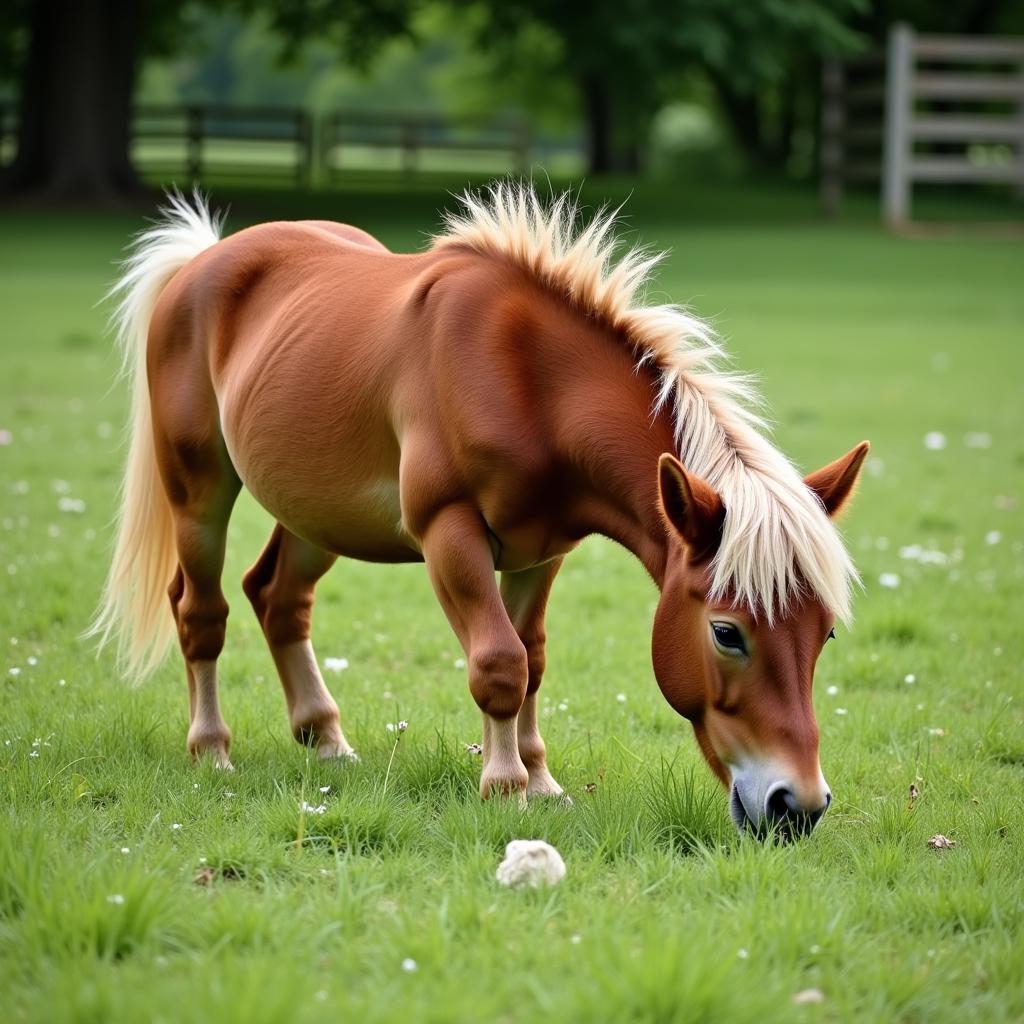Miniature horses have captured the hearts of horse lovers nationwide. Their diminutive size, endearing personalities, and manageable care requirements make them particularly appealing. But what about a free mini horse? The prospect is undoubtedly tempting, but it’s crucial to approach it with a balanced perspective.
 Miniature Horse Grazing Pasture
Miniature Horse Grazing Pasture
Understanding the Allure of a Free Mini Horse
The idea of a Free Mini Horse can be especially enticing for first-time horse owners or those with limited budgets. After all, who wouldn’t want to welcome a charming equine companion without the initial purchase cost? However, responsible horse ownership, even on a miniature scale, always involves ongoing financial commitments.
The Hidden Costs of “Free”
While the initial acquisition might be free, numerous expenses are associated with responsible mini horse ownership. These include:
- Feed and Hay: Even mini horses need a balanced diet of quality hay and possibly grain, depending on their nutritional needs and activity level.
- Veterinary Care: Routine checkups, vaccinations, deworming, and potential emergency care are essential for your mini horse’s well-being.
- Farrier Services: Regular hoof trims by a qualified farrier are crucial to maintain your mini horse’s soundness.
- Housing and Fencing: Mini horses require safe and secure fencing and shelter from the elements.
Why are Some Mini Horses Free?
There are several reasons why a mini horse might be offered for free:
- Downsizing or Lifestyle Changes: Owners facing life changes may seek new homes for their mini horses.
- Behavioral Issues: Some mini horses may exhibit behavioral problems that make them unsuitable for their current situation.
- Unplanned Breeding: Accidental pregnancies can lead to an overabundance of mini horses, making it difficult for owners to find suitable homes.
Before You Say “Yes” to a Free Mini Horse
It’s essential to do your due diligence before accepting a free mini horse. Consider these crucial factors:
- Thorough Health Check: Have a veterinarian examine the mini horse to assess its overall health and identify any potential issues.
- Temperament and Training: Spend time interacting with the mini horse to evaluate its temperament and training level. Ensure it’s a good fit for your experience and capabilities.
- Honest Conversation with the Current Owner: Discuss the mini horse’s history, care requirements, and any known health or behavioral concerns.
Alternatives to a Free Mini Horse
If the costs or logistics of owning a mini horse seem daunting, consider these alternatives:
- Lease a Mini Horse: Leasing allows you to experience mini horse ownership without the long-term commitment.
- Volunteer at a Rescue or Sanctuary: Volunteering provides a rewarding way to interact with mini horses and learn about their care.
- Sponsor a Mini Horse: Sponsoring a mini horse at a rescue or sanctuary helps cover its expenses while allowing you to stay connected.
Making Informed Decisions for You and the Horse
Ultimately, the decision to acquire a mini horse, free or otherwise, is significant. While the appeal of a free mini horse is undeniable, responsible ownership requires careful consideration of the financial and logistical commitments involved. Thorough research, honest self-assessment, and a commitment to the horse’s well-being are paramount. Remember, providing a safe, healthy, and loving environment is the greatest gift you can give any horse, regardless of its size or acquisition cost.
FAQs about Free Mini Horses
1. Are free mini horses usually healthy?
There’s no guarantee. While some free mini horses may be perfectly healthy, others may have underlying health or behavioral issues. It’s crucial to have any potential equine companion thoroughly evaluated by a veterinarian before making a commitment.
2. What should I ask the current owner of a free mini horse?
Inquire about the mini horse’s history, health records, temperament, training level, and any reasons for rehoming. Be open and honest about your experience level and what you can provide.
3. Can I keep a mini horse with other animals?
Mini horses are generally social animals and can thrive in the company of other equines or livestock. However, introductions should be done gradually and with caution. Always supervise interactions between different species.
4. What are the signs of a healthy mini horse?
A healthy mini horse should have bright eyes, a shiny coat, good appetite, regular bowel movements, and sound hooves. They should be alert, active, and display a willingness to interact.
5. Where can I find reputable mini horse rescues?
You can search online for mini horse rescues or sanctuaries in your area. Ask for referrals from your veterinarian, farrier, or other equine professionals.
Do you need help with your horses?
If you need assistance with your horses, contact us immediately!
Hotline: 0772127271
Email: [email protected]
Or visit us at: QGM2+WX2, Vị Trung, Vị Thuỷ, Hậu Giang, Việt Nam.
Our customer service team is available 24/7.